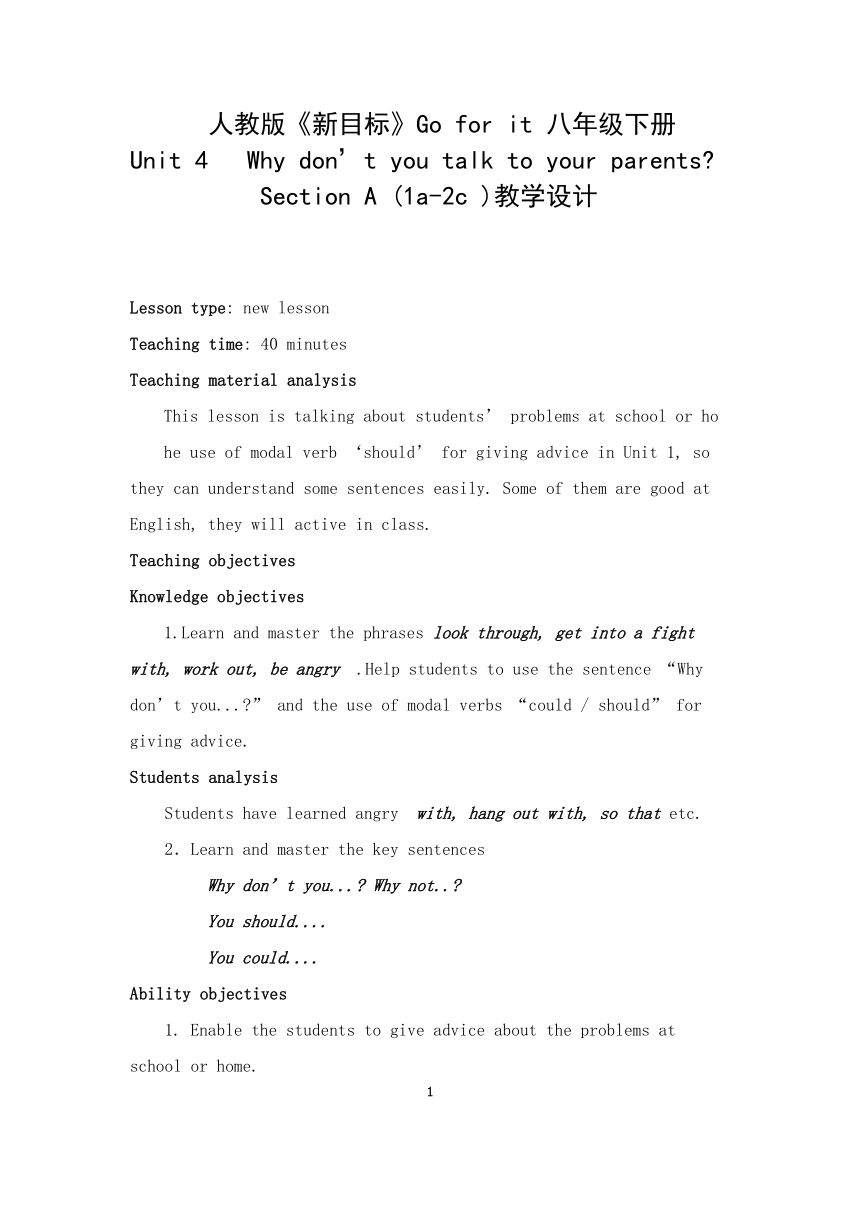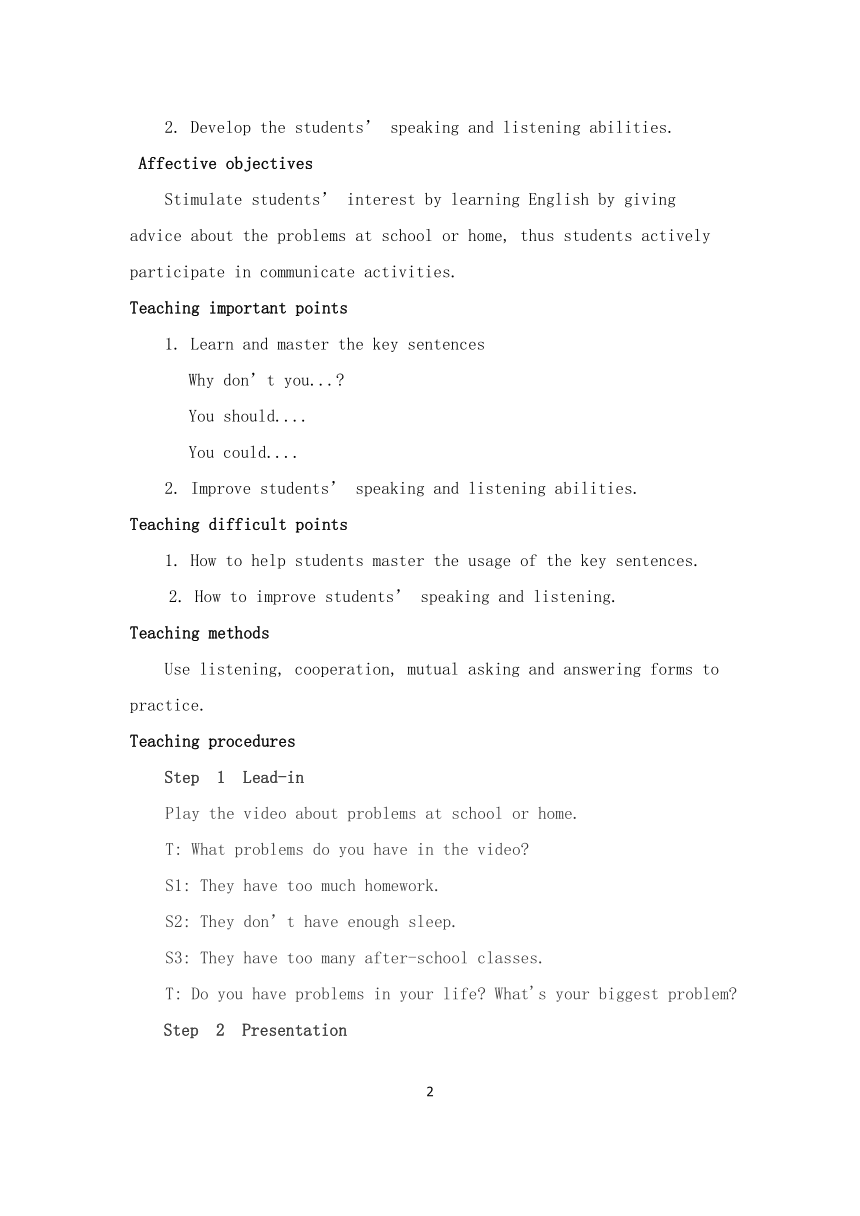Unit4 Why don't you talk to your parents?Section A (1a-2c )教学设计(教案)
文档属性
| 名称 | Unit4 Why don't you talk to your parents?Section A (1a-2c )教学设计(教案) |

|
|
| 格式 | doc | ||
| 文件大小 | 36.5KB | ||
| 资源类型 | 教案 | ||
| 版本资源 | 人教新目标(Go for it)版 | ||
| 科目 | 英语 | ||
| 更新时间 | 2022-03-27 00:00:00 | ||
图片预览


文档简介
人教版《新目标》Go for it 八年级下册
Unit 4 Why don’t you talk to your parents
Section A (1a-2c )教学设计
Lesson type: new lesson
Teaching time: 40 minutes
Teaching material analysis
This lesson is talking about students’ problems at school or ho
he use of modal verb ‘should’ for giving advice in Unit 1, so they can understand some sentences easily. Some of them are good at English, they will active in class.
Teaching objectives
Knowledge objectives
1.Learn and master the phrases look through, get into a fight with, work out, be angry .Help students to use the sentence “Why don’t you... ” and the use of modal verbs “could / should” for giving advice.
Students analysis
Students have learned angry with, hang out with, so that etc.
2.Learn and master the key sentences
Why don’t you... Why not..
You should....
You could....
Ability objectives
1. Enable the students to give advice about the problems at school or home.
2. Develop the students’ speaking and listening abilities.
Affective objectives
Stimulate students’ interest by learning English by giving advice about the problems at school or home, thus students actively participate in communicate activities.
Teaching important points
1. Learn and master the key sentences
Why don’t you...
You should....
You could....
2. Improve students’ speaking and listening abilities.
Teaching difficult points
1. How to help students master the usage of the key sentences.
2. How to improve students’ speaking and listening.
Teaching methods
Use listening, cooperation, mutual asking and answering forms to practice.
Teaching procedures
Step 1 Lead-in
Play the video about problems at school or home.
T: What problems do you have in the video
S1: They have too much homework.
S2: They don’t have enough sleep.
S3: They have too many after-school classes.
T: Do you have problems in your life What's your biggest problem
Step 2 Presentation
1. Look at these problems. Do you think they are serious or not Ss discuss with their partners and give some advice.
① I have to study too much so I don’t get enough sleep.
② I have too much homework so I don’t have any free time to do things I like.
③ My parents don’t allow me to hang out with my friends.
allow sb. to do sth.
④ I have too many after-school classes.
⑤ I got into a fight with my best friend.
get into a fight with sb.
2. Discuss these problems and give some advice.
Why don’t you do... / Why not do...
You should...
You could…
(1)I have to study too much so I don’t get enough sleep.
Why don’t you go to sleep earlier this evening
(2)Ask the students to give some advice about the problems
Step 3 Listening
Work on 1b
1. Tell Ss to read the sentences in 1a again. Make sure they know the meaning of the sentences.
2. Play the recording for the Ss to listen and circle the problems you hear in 1a.
Work on 2a
T: Peter has some problems. What advice does his friend give him Fill in the blanks with could or should.
1. Let Ss read the sentences in 2a.
2. Play the recording for the Ss to listen and write the words in the blank.
3. Play the recording again to check the answers.
Work on 2b
1. Let Ss read the sentences below. Explain some main sentences for the Ss. Make sure they know the meaning of each sentence.
2. Play the recording for the Ss to write the letters (a-e) next to the advice in 2a.
3. Play the recording again to check the answers.
Step 4 Practice
1.Let Ss read the conversation in the example.
A: What’s wrong B: I'm really tired because I studied until midnight last night.
A: Why don’t you go to bed earlier this evening
B: That sounds good.
2.Let the students make new conversations. Talk about your problem s and your partners give some advice.
Why don’t you do... Why not do...
You should...
You could…
3. Let some pairs act out their conversations.
4. Tell the students a real thing.
Step 5 Production
Do a survey, then fill in the chart.
Name The biggest problem Advice
Mary Isn’t good at English Ask the teacher for help
… … …
In our group, we have many problems. But we come up with a lot of good ideas. Mary isn’t good at English. She should ask the teacher for help. Tom.....
Step 6 Summary
Give others some advice, we can use:
Why don’t you do... /Why not do...
You should...
You could…
Step 7 Homework
Write three conversations about your problems and your friends’ suggestions.
Blackboard design
Unit 4 Why don’t you talk to your parents
Why don’t you ...?
Why not ...?
You could....
You should....
PAGE
1
Unit 4 Why don’t you talk to your parents
Section A (1a-2c )教学设计
Lesson type: new lesson
Teaching time: 40 minutes
Teaching material analysis
This lesson is talking about students’ problems at school or ho
he use of modal verb ‘should’ for giving advice in Unit 1, so they can understand some sentences easily. Some of them are good at English, they will active in class.
Teaching objectives
Knowledge objectives
1.Learn and master the phrases look through, get into a fight with, work out, be angry .Help students to use the sentence “Why don’t you... ” and the use of modal verbs “could / should” for giving advice.
Students analysis
Students have learned angry with, hang out with, so that etc.
2.Learn and master the key sentences
Why don’t you... Why not..
You should....
You could....
Ability objectives
1. Enable the students to give advice about the problems at school or home.
2. Develop the students’ speaking and listening abilities.
Affective objectives
Stimulate students’ interest by learning English by giving advice about the problems at school or home, thus students actively participate in communicate activities.
Teaching important points
1. Learn and master the key sentences
Why don’t you...
You should....
You could....
2. Improve students’ speaking and listening abilities.
Teaching difficult points
1. How to help students master the usage of the key sentences.
2. How to improve students’ speaking and listening.
Teaching methods
Use listening, cooperation, mutual asking and answering forms to practice.
Teaching procedures
Step 1 Lead-in
Play the video about problems at school or home.
T: What problems do you have in the video
S1: They have too much homework.
S2: They don’t have enough sleep.
S3: They have too many after-school classes.
T: Do you have problems in your life What's your biggest problem
Step 2 Presentation
1. Look at these problems. Do you think they are serious or not Ss discuss with their partners and give some advice.
① I have to study too much so I don’t get enough sleep.
② I have too much homework so I don’t have any free time to do things I like.
③ My parents don’t allow me to hang out with my friends.
allow sb. to do sth.
④ I have too many after-school classes.
⑤ I got into a fight with my best friend.
get into a fight with sb.
2. Discuss these problems and give some advice.
Why don’t you do... / Why not do...
You should...
You could…
(1)I have to study too much so I don’t get enough sleep.
Why don’t you go to sleep earlier this evening
(2)Ask the students to give some advice about the problems
Step 3 Listening
Work on 1b
1. Tell Ss to read the sentences in 1a again. Make sure they know the meaning of the sentences.
2. Play the recording for the Ss to listen and circle the problems you hear in 1a.
Work on 2a
T: Peter has some problems. What advice does his friend give him Fill in the blanks with could or should.
1. Let Ss read the sentences in 2a.
2. Play the recording for the Ss to listen and write the words in the blank.
3. Play the recording again to check the answers.
Work on 2b
1. Let Ss read the sentences below. Explain some main sentences for the Ss. Make sure they know the meaning of each sentence.
2. Play the recording for the Ss to write the letters (a-e) next to the advice in 2a.
3. Play the recording again to check the answers.
Step 4 Practice
1.Let Ss read the conversation in the example.
A: What’s wrong B: I'm really tired because I studied until midnight last night.
A: Why don’t you go to bed earlier this evening
B: That sounds good.
2.Let the students make new conversations. Talk about your problem s and your partners give some advice.
Why don’t you do... Why not do...
You should...
You could…
3. Let some pairs act out their conversations.
4. Tell the students a real thing.
Step 5 Production
Do a survey, then fill in the chart.
Name The biggest problem Advice
Mary Isn’t good at English Ask the teacher for help
… … …
In our group, we have many problems. But we come up with a lot of good ideas. Mary isn’t good at English. She should ask the teacher for help. Tom.....
Step 6 Summary
Give others some advice, we can use:
Why don’t you do... /Why not do...
You should...
You could…
Step 7 Homework
Write three conversations about your problems and your friends’ suggestions.
Blackboard design
Unit 4 Why don’t you talk to your parents
Why don’t you ...?
Why not ...?
You could....
You should....
PAGE
1
同课章节目录
- Unit 1 What's the matter?
- Section A
- Section B
- Unit 2 I'll help to clean up the city parks.
- Section A
- Section B
- Unit 3 Could you please clean your room?
- Section A
- Section B
- Unit 4 Why don't you talk to your parents?
- Section A
- Section B
- Unit 5 What were you doing when the rainstorm came
- Section A
- Section B
- Review of Units 1-5
- Unit 6 An old man tried to move the mountains.
- Section A
- Section B
- Unit 7 What's the highest mountain in the world?
- Section A
- Section B
- Unit 8 Have you read Treasure Island yet?
- Section A
- Section B
- Unit 9 Have you ever been to a museum?
- Section A
- Section B
- Unit 10 I've had this bike for three years.
- Section A
- Section B
